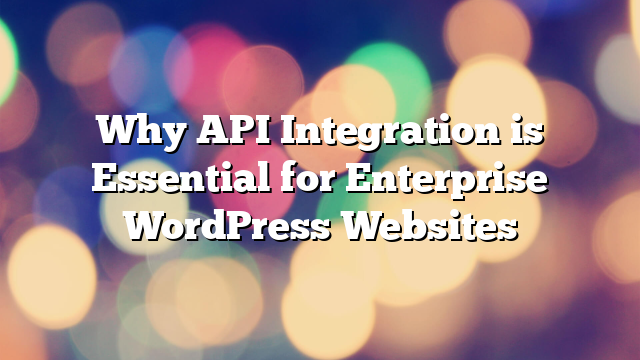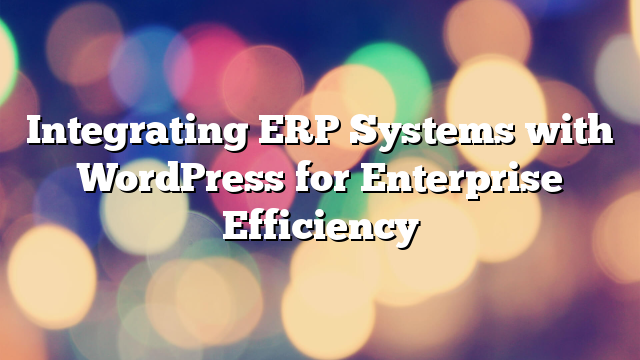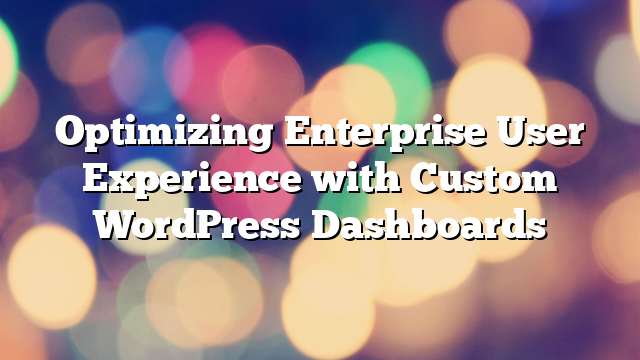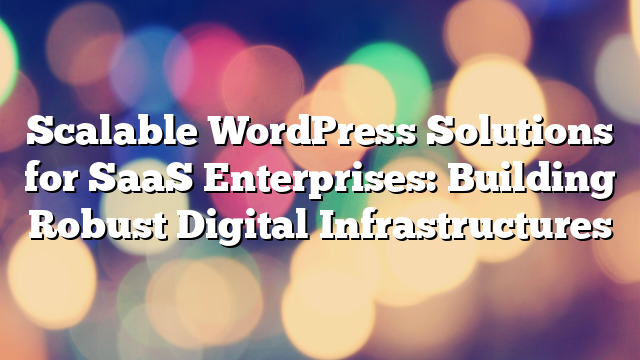Why API Integration is Essential for Enterprise WordPress Websites
21.11.2024

Why API Integration is Essential for Enterprise WordPress Websites
Modern enterprises rely on interconnected systems to streamline operations and deliver seamless user experiences. For businesses using WordPress at an enterprise scale, API integration is no longer optional—it’s essential. APIs (Application Programming Interfaces) enable WordPress to communicate with other software, tools, and platforms, extending its functionality beyond a traditional content management system (CMS). In this article, we’ll explore why API integration is critical for enterprise WordPress websites and how it supports scalability, customization, and operational efficiency.
Understanding API Integration
API integration involves connecting WordPress with external systems through APIs, which act as intermediaries for data exchange. Whether integrating with a CRM, payment gateway, marketing automation platform, or custom application, APIs enable seamless communication between WordPress and third-party tools. This allows enterprises to build a robust digital ecosystem tailored to their unique needs.
Key Benefits of API Integration for Enterprise WordPress
1. Enhanced Scalability
As enterprises grow, so do their technological requirements. API integration allows WordPress to scale effortlessly by connecting it with specialized tools and platforms. For example, an enterprise can integrate WordPress with a headless architecture using REST or GraphQL APIs, enabling it to serve content to various channels like mobile apps, IoT devices, and more.
2. Improved Operational Efficiency
Manual data entry and disconnected systems can slow down enterprise operations. API integration automates processes, such as syncing customer data between WordPress and a CRM or updating inventory levels in real time from an ERP system. This reduces manual workload, minimizes errors, and enhances overall efficiency.
3. Customizable User Experiences
APIs allow enterprises to create highly personalized and interactive user experiences. By integrating WordPress with analytics platforms or customer data platforms (CDPs), businesses can gather insights about user behavior and tailor content accordingly. Personalized product recommendations, dynamic content, and custom dashboards are just a few examples of what’s possible.
4. Seamless E-commerce Functionality
For enterprises using WordPress for e-commerce, APIs are indispensable. They enable integration with payment gateways like Stripe or PayPal, shipping providers, and inventory management systems. This ensures that the e-commerce store operates smoothly, offering customers a hassle-free shopping experience while keeping back-end operations organized.
5. Omnichannel Content Delivery
In today’s digital-first world, enterprises must engage customers across multiple platforms. API integration enables WordPress to act as a centralized content hub, delivering content to websites, mobile apps, social media, and other channels. This ensures consistency in messaging while allowing flexibility in presentation.
Common API Integrations for Enterprise WordPress
1. CRM Integration
Integrating WordPress with CRM systems like Salesforce, HubSpot, or Zoho ensures seamless data flow between the website and sales or marketing teams. Enterprises can capture leads, track customer interactions, and optimize conversion strategies directly from their WordPress site.
2. Marketing Automation Tools
APIs connect WordPress with tools like Mailchimp, Marketo, or ActiveCampaign, enabling automated email campaigns, personalized content delivery, and better audience segmentation. This boosts marketing efficiency and enhances engagement.
3. Payment Gateways
For e-commerce enterprises, integrating payment gateways through APIs ensures secure and smooth transactions. Popular APIs include Stripe, PayPal, and Authorize.Net, each offering reliable payment solutions tailored to business needs.
4. ERP and Inventory Management Systems
Enterprises with extensive product catalogs or supply chains benefit from integrating WordPress with ERP systems like SAP or inventory tools like TradeGecko. This ensures real-time updates on stock levels, order processing, and logistics.
5. Analytics Platforms
APIs enable WordPress to connect with analytics tools such as Google Analytics, Mixpanel, or Tableau. This integration provides detailed insights into user behavior, helping enterprises optimize their websites for performance and conversions.
Challenges of API Integration
1. Complexity in Implementation
API integration can be complex, especially for enterprises with unique workflows and legacy systems. It requires careful planning, development expertise, and robust testing to ensure seamless functionality.
2. Data Security and Privacy
Exchanging data between WordPress and external systems introduces potential security risks. Enterprises must implement secure authentication methods, such as OAuth or API keys, and comply with data privacy regulations like GDPR or CCPA.
3. Performance Concerns
Improperly implemented API integrations can slow down website performance. Enterprises need to optimize API calls, use caching strategies, and monitor API performance to prevent latency issues.
Best Practices for Enterprise API Integration
1. Choose Reliable APIs
Select APIs from trusted providers with comprehensive documentation and strong support. Reliable APIs ensure smooth integration and reduce the risk of downtime.
2. Prioritize Security
Use secure communication protocols like HTTPS, implement API rate limiting, and regularly audit API access logs to prevent unauthorized access and ensure data integrity.
3. Test Extensively
Thorough testing is crucial to ensure the API integration works as intended. Conduct functional, performance, and security testing to identify and resolve issues before deployment.
4. Monitor and Optimize
Continuously monitor API performance and usage. Use tools like Postman or custom monitoring solutions to identify bottlenecks and optimize API calls for better efficiency.
Conclusion
API integration is a cornerstone of enterprise WordPress development, enabling businesses to extend functionality, streamline operations, and deliver exceptional user experiences. While the process may involve challenges, the benefits far outweigh the complexities, making it a must-have for modern enterprises.
Looking to integrate powerful APIs with your WordPress site? Contact AllWebDev for expert API integration services tailored to your enterprise needs.



